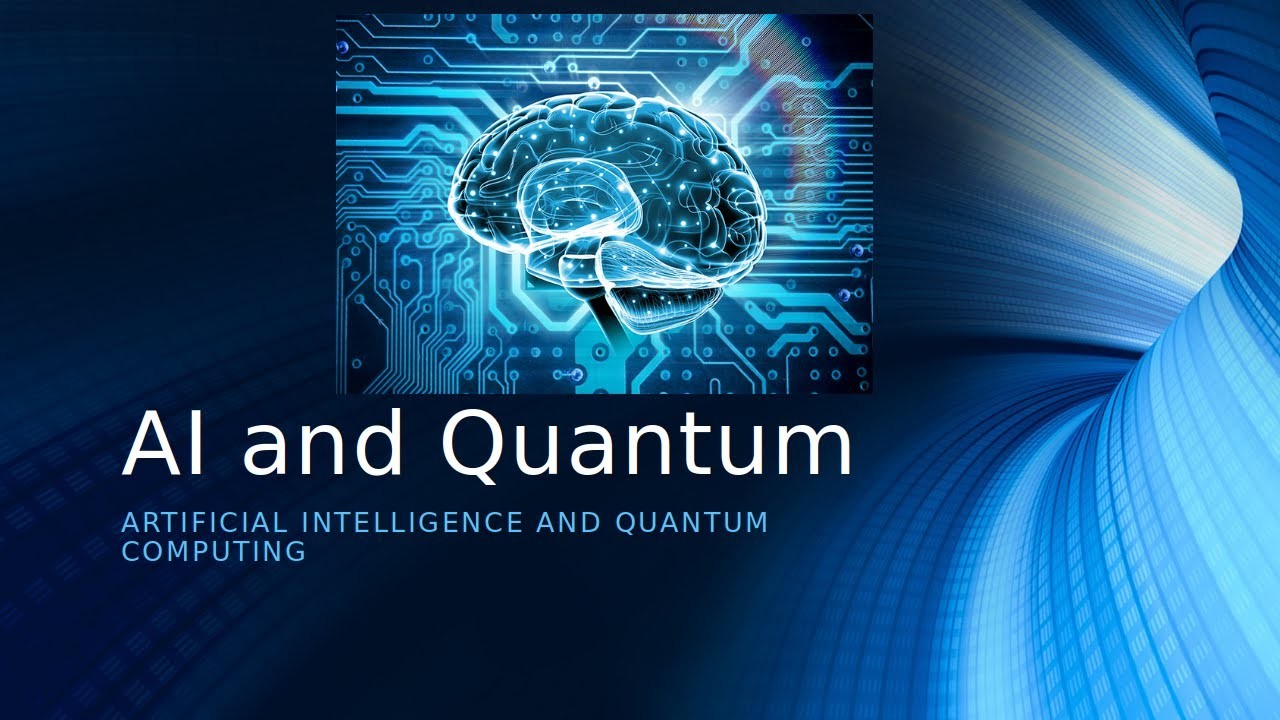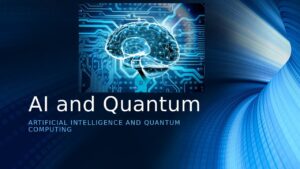The rapid evolution of technology is transforming the way we live, work, and interact. Among the most exciting and potentially disruptive innovations of the 21st century are Artificial Intelligence (AI) and Quantum Computing. Individually, each is poised to revolutionize entire industries, but what happens when these two forces come together? This blog explores how AI and quantum computing are shaping the future, from healthcare to cybersecurity, and the potential they hold for solving problems that were previously thought impossible.
1. Understanding the Basics: What Are AI and Quantum Computing?
What is Artificial Intelligence (AI)?
Artificial Intelligence refers to the creation of computer systems capable of performing tasks that would typically require human intelligence. These tasks can range from decision-making to pattern recognition, speech recognition, problem-solving, and even the ability to learn from data and improve over time.
AI is generally classified into three categories:
- Narrow AI: This type of AI is specialized in performing specific tasks, like Siri, Google Assistant, or recommendation algorithms used by Netflix or Amazon. These systems excel in narrow domains but lack general intelligence.
- General AI: This represents an AI that can understand and reason across a wide range of tasks, much like a human. We have yet to achieve general AI.
- Superintelligent AI: A hypothetical AI that surpasses human intelligence in all domains, including creativity, problem-solving, and emotional understanding. This remains a distant goal and is the subject of much debate among AI researchers.
Applications of AI are already widespread. From self-driving cars, personalized recommendations, and chatbots to advanced machine learning algorithms, AI is transforming how businesses operate, offering efficiency, precision, and even new services that weren’t possible before.
What is Quantum Computing?
Quantum computing, on the other hand, represents a fundamentally different approach to computation. While classical computers rely on binary bits to process data (0 or 1), quantum computers use quantum bits, or qubits. These qubits can represent both 0 and 1 simultaneously, thanks to a quantum property called superposition. This allows quantum computers to perform many calculations at once, exponentially increasing their processing power.
In addition to superposition, quantum computers also leverage another phenomenon known as entanglement, where the state of one qubit can depend on the state of another, no matter how far apart they are. These quantum properties allow quantum computers to solve complex problems much faster than classical computers could ever manage.
Quantum computing holds the promise of solving problems that are intractable for classical computers. While current quantum computers are still in the early stages of development (called “Noisy Intermediate-Scale Quantum” or NISQ devices), companies like IBM, Google, and startups like Rigetti Computing are pushing the envelope with every passing year. The dream is that, eventually, quantum computers will be able to crack codes, simulate molecules, and optimize logistical operations far beyond current capabilities.
2. The Current State of AI and Quantum Computing
The State of AI Today
Artificial Intelligence has already infiltrated many aspects of our daily lives. AI-powered tools are used in a wide variety of fields, including:
- Healthcare: AI algorithms can diagnose diseases, interpret medical imaging, and even predict patient outcomes. Systems like IBM Watson are helping oncologists develop personalized treatment plans for cancer patients, while AI-based drug discovery platforms are accelerating the search for new medications.
- Finance: AI algorithms are used for fraud detection, high-frequency trading, and predictive analytics. Financial institutions use machine learning models to analyze patterns in vast amounts of data and make more informed decisions, often faster than humans can.
- Customer Service: AI chatbots and virtual assistants are now common in customer service environments. They help businesses streamline operations and provide faster responses to customer inquiries.
Despite the massive progress, there’s still much to be done. AI remains far from perfect. Issues like bias in algorithms, a lack of interpretability in machine learning models, and concerns over privacy still need to be addressed. Nevertheless, AI’s continued growth is undeniable.
The State of Quantum Computing Today
Quantum computing, by contrast, is still in its infancy. Current quantum computers are primarily experimental, and their capabilities are limited. Nevertheless, researchers and companies are making tremendous strides.
- IBM and Google have developed quantum processors capable of handling small tasks, such as simulating quantum systems or solving optimization problems.
- IBM’s Qiskit and Google’s Cirq are tools that enable developers to write quantum algorithms, while hardware manufacturers like Rigetti Computing are working on building quantum processors that are more stable and scalable.
While no quantum computer has yet surpassed classical computers in real-world applications, quantum computing is undoubtedly on the horizon to make significant breakthroughs. For example, quantum supremacy, the point at which a quantum computer can solve a problem that would be impossible for classical computers, was claimed by Google in 2019 with their 53-qubit processor, Sycamore. However, this achievement was still a demonstration of quantum computing’s potential, rather than a practical, commercially viable technology.

3. How AI and Quantum Computing Work Together
The true excitement lies in the convergence of AI and quantum computing. Although each technology is transformative on its own, the combination of the two could bring about unimaginable advances. Here’s how they work together:
Quantum AI
AI is heavily reliant on vast amounts of data and computational power to learn and adapt. This is where quantum computing can make a difference. The quantum properties of superposition and entanglement allow quantum computers to handle significantly more data and perform faster calculations than classical computers.
For example, training a deep learning model today requires immense computational resources, particularly when dealing with large datasets. Quantum algorithms have the potential to speed up this process exponentially. Some areas where quantum computing could enhance AI include:
- Faster Training for Machine Learning Models: Quantum computers can process a massive number of possibilities at once, speeding up the training of machine learning models and potentially improving their accuracy.
- Quantum Neural Networks: The development of quantum neural networks (QNNs) could open up new avenues in machine learning, leveraging quantum states to create new forms of artificial intelligence that were previously unthinkable.
- Optimization Problems: Many AI applications, like natural language processing (NLP) or recommendation systems, rely on solving optimization problems. Quantum computing’s ability to explore multiple solutions simultaneously could make these processes much more efficient.
AI for Quantum Computing
Conversely, AI can also help improve the development of quantum computing. One of the main challenges in quantum computing is the error rate—quantum computers are notoriously prone to noise and inaccuracies. AI can be used to mitigate these issues by predicting and correcting errors in quantum operations.
AI algorithms are also being employed to help researchers design better quantum circuits and optimize quantum hardware. AI-driven methods are accelerating the discovery of new quantum algorithms and making quantum computing more accessible to researchers and developers.
4. Real-World Applications of AI and Quantum Computing
Healthcare
One of the most promising applications of both AI and quantum computing is in healthcare. AI has already proven invaluable in medical research and diagnostics, and quantum computing could take it to the next level.
- Drug Discovery: Quantum computers can simulate molecular interactions with much higher accuracy than classical computers, which could accelerate drug discovery processes. AI can help analyze the data from these simulations to identify potential drug candidates faster.
- Personalized Medicine: AI is already being used to analyze patient data and predict the best course of treatment for individuals. When combined with quantum computing’s ability to model biological systems, doctors could receive even more precise recommendations for personalized care.
Finance
The financial industry is another area where the convergence of AI and quantum computing is having a profound impact.
- Risk Management: Quantum computing can model complex financial markets much more efficiently than classical computers, allowing for more accurate predictions and better risk management strategies. AI algorithms could analyze these predictions to improve decision-making in real-time.
- Fraud Detection: AI-based fraud detection systems are already in place, but quantum computing could further enhance their ability to identify anomalies and potential fraud by processing much larger datasets at faster speeds.
Cybersecurity
As quantum computers mature, they could pose a significant threat to existing encryption methods. Quantum computers can break traditional encryption techniques like RSA and AES, which rely on the difficulty of factoring large numbers or solving discrete logarithm problems. AI, however, can be used to develop new forms of quantum-resistant cryptography, ensuring that data remains secure in a post-quantum world.
Moreover, quantum computers themselves can be used to enhance cybersecurity through the creation of unbreakable encryption methods, such as quantum key distribution (QKD). When combined with AI’s ability to monitor and detect potential security breaches in real time, these technologies will play a critical role in protecting sensitive information.
5. Challenges and Ethical Considerations
While the convergence of AI and quantum computing offers immense potential, several challenges and ethical concerns remain.
Access and Equity
One of the main challenges is the accessibility of these technologies. Quantum computing and AI research are currently being led by tech giants like Google, IBM, and Microsoft, which raises concerns about the democratization of technology. If only a few entities control these technologies, it could lead to significant power imbalances and monopolies.
Security
As mentioned earlier, quantum computers could break current encryption systems. This presents a significant challenge to cybersecurity and digital privacy. AI will play a crucial role in developing new encryption methods and securing systems, but it will also need to evolve quickly to stay ahead of quantum threats.
Ethical AI
AI systems often suffer from biases that reflect those present in the data used to train them. As AI becomes more prevalent in decision-making processes, it’s crucial to ensure that these systems are fair, transparent, and accountable. Quantum computing may exacerbate this problem if AI models become more complex and harder to interpret.
6. The Road Ahead: What’s Next for AI and Quantum Computing?
The combination of AI and quantum computing is still in its early stages, but the potential is immense. Over the next decade, we’re likely to see significant advancements in both fields.
- Quantum Computing’s Timeline: While quantum computers are still limited, experts predict that within 5 to 10 years, they will be capable of solving real-world problems that are currently beyond the reach of classical computers.
- AI’s Continued Evolution: AI will continue to evolve, becoming more efficient, ethical, and transparent. We will likely see even more sophisticated applications in fields like healthcare, law, and education.
- Collaboration Between AI and Quantum: As AI and quantum computing continue to evolve, expect to see even deeper collaboration between the two. Researchers are working on quantum-inspired AI algorithms, and AI is helping to drive the development of more powerful quantum systems.
Conclusion: Shaping the Future, One Quantum Leap at a Time
The combination of artificial intelligence and quantum computing represents the next frontier of technology. These two fields have the potential to solve complex problems that were once thought to be unsolvable, from curing diseases and protecting data to unlocking the mysteries of the universe.
But as we venture into this brave new world, it’s crucial that we proceed with caution. The ethical, security, and accessibility challenges must be addressed to ensure that these technologies benefit all of humanity, rather than just a select few.
The future is bright, and AI and quantum computing will undoubtedly shape it in ways we can only begin to imagine. As we continue to push the boundaries of what’s possible, the question is no longer whether we can create these technologies—but rather, how we will use them to shape a better, more equitable future.
Share this content:



















Post Comment